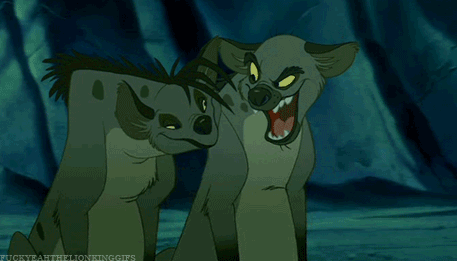
Reading these two pieces in conversation was a testament to academic writing as a conversation. John Morton’s essay “Simba’s Revolution: Revisiting History and Class in the Lion King” was a great example of “I concede, but” in response to Robert Gooding-Williams piece “Disney in Africa and The Inner City: On Race and Space in the Lion King”.
Though Williams’s pieces did have a promising thesis, he went too far with his analysis and pushed his piece into convolution. Some of his political commentary is strong because, as we have discussed at length, Disney does not exist in a void and it does speak to greater cultural values and trends. Thus Williams’s conception of the Lion King universe as those who have political power and those who don’t is valid. However, he integrates too much of his own personal political views and his argument loses merit. I understand where he is coming from in the argument that the hyenas, as voiced by Whoopi Goldberg and Cheech Marin, are representative of a marginalized Other, I think it is equally possible that they were just two of the most notable comedians of the time, so of course Disney tapped them to be in the film.
I enjoyed reading Morton’s response to Gooding, as it gave credit where credit was due, while still aptly discussing the shortcomings of his argument. Although Morton appropriately calls out Gooding-Williams for overstepping in his interpretation, Morton’s first main criticism of Gooding-Williams is that his take on the ahistoric portrayal of Africa is completely off base. Gooding-Williams sees a vision of Africa in Disney’s depiction of Pride Rock— “steeped in the spiritually static and essentially unchanging conditions of ‘mere nature’.” However, the ‘circle of life’, the central image and theme of the film, seems to be pretty dynamic. Further, though Mufasa discusses the shadowy area to the north as a forbidden place, he never specifies why it is forbidden or what political tensions could have brought it into existence. In fact, the entire history of Pride Rock is presented as full of benevolent rulers, a testament being the watchful kings in the night sky. Morton, however, sees the plot of The Lion King as evident of the historic nature of the place. What makes the movie a compelling story is that the Scar power-grab is deviates from the norm.
That being said, Morton makes an interesting point of distinguishing the conflict in The Lion King as between producers and scavengers. Disney may not have initially intended this dynamic to invite a strong political analysis, but it would make sense that both Gooding-Williams and Morton found something political inherent in the depiction of this good/evil dichotomy. Gooding-Williams, however, was problematic in assuming that most viewers of the film would read the scavengers as black and Latino urban citizens.
Thus, neither argument was foolproof. Though both had valid points they also each felt like a stretch. Regardless, I feel as though Morton's was the stronger piece as it was able to take a step back and did not feel infused with personal bias.



No comments:
Post a Comment